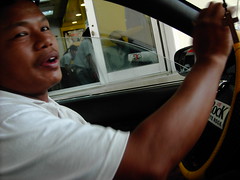ASEAN
26 September 2014
Metro Manila, the film
Metro Manila, the film, is a story of poverty, despair, helplessness and hopelessness of a farming family that migrates to Manila with vain hopes of a better life.
Metro Manila, the film, is a story of poverty, despair, helplessness and hopelessness of a farming family that migrates to Manila with vain hopes of a better life.
This British Filipino production is directed by Sean Ellis, and stars Jake Macapagal, Althea Vega and John Areilla. It is currently playing in Toronto, and is a must-see!
Oscar and Mai are young rice farmers, with two daughters, from the picturesque Filipino province of Banaue. When they learn that they do not even have enough money to purchase their rice seeds for next year, they decide that they have no choice but to migrate to Manila. Oscar reassures one of his daughters that they will find a dentist there for her sore tooth.
As soon as they arrive, they fall victim of a scam landlord who rents them an apartment which he does not own, and from which they are evicted. Having lost all their money, they then move to a tumbledown free squat in a slum.
Oscar is hired as a day laborer, but his only compensation turns out to be some food rather than money. Mai works as a "guest relations officer" in a shady bar, where she must employ seductive behavior to entice her (mainly Western) customers to drink. When she slips below her target quota of 20 drinks a day, the "mamasan" suggests that her 9 year old daughter join in the action.
Oscar gets hired as an armored-car guard, only to find that his immediate boss is deep in the organization of a robbery. The boss gets killed by his accomplices. As Oscar attempts to make off with the money, he becomes a victim himself.
This story of great suspense and drama might seem a bit melodramatic to Western audiences. But the tragedy is that the story is all too real. Poor migrants to cities like Manila are, due to their desperation, exposed to sleaze, corruption, thugs and betrayal.
Development economists like to paint a rosy picture of urbanization. Rural residents move from low paying jobs in the country to much higher paying jobs in the city, and drive the economy upward, so the story goes.
But all too often, the reality is different. Rural residents move to the city in search of jobs that may not even exist, especially in weak economies like the Philippines. The failure of governments to invest in infrastructure means that very often the basics of life do not exist -- things like clean water, sanitation, and safe housing, not to speak of education and health services.
And the criminalization and violence of life in the city are things that country folk are just not prepared for.
This film is important in highlighting the dark side of urbanization, and is a must-see for scholars of the Asian Century, and the general public alike.
Executive Director
Asian Century Institute
This British Filipino production is directed by Sean Ellis, and stars Jake Macapagal, Althea Vega and John Areilla. It is currently playing in Toronto, and is a must-see!
Oscar and Mai are young rice farmers, with two daughters, from the picturesque Filipino province of Banaue. When they learn that they do not even have enough money to purchase their rice seeds for next year, they decide that they have no choice but to migrate to Manila. Oscar reassures one of his daughters that they will find a dentist there for her sore tooth.
As soon as they arrive, they fall victim of a scam landlord who rents them an apartment which he does not own, and from which they are evicted. Having lost all their money, they then move to a tumbledown free squat in a slum.
Oscar is hired as a day laborer, but his only compensation turns out to be some food rather than money. Mai works as a "guest relations officer" in a shady bar, where she must employ seductive behavior to entice her (mainly Western) customers to drink. When she slips below her target quota of 20 drinks a day, the "mamasan" suggests that her 9 year old daughter join in the action.
Oscar gets hired as an armored-car guard, only to find that his immediate boss is deep in the organization of a robbery. The boss gets killed by his accomplices. As Oscar attempts to make off with the money, he becomes a victim himself.
This story of great suspense and drama might seem a bit melodramatic to Western audiences. But the tragedy is that the story is all too real. Poor migrants to cities like Manila are, due to their desperation, exposed to sleaze, corruption, thugs and betrayal.
Development economists like to paint a rosy picture of urbanization. Rural residents move from low paying jobs in the country to much higher paying jobs in the city, and drive the economy upward, so the story goes.
But all too often, the reality is different. Rural residents move to the city in search of jobs that may not even exist, especially in weak economies like the Philippines. The failure of governments to invest in infrastructure means that very often the basics of life do not exist -- things like clean water, sanitation, and safe housing, not to speak of education and health services.
And the criminalization and violence of life in the city are things that country folk are just not prepared for.
This film is important in highlighting the dark side of urbanization, and is a must-see for scholars of the Asian Century, and the general public alike.
Author
John WestExecutive Director
Asian Century Institute




